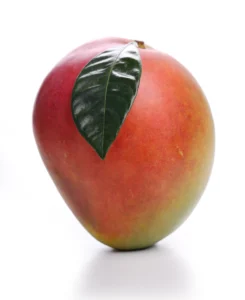Mango fruit: Nutritional properties and health benefits
The fruit known as Mango is a tropical fruit produced by the plant of the same name belonging to the Genus Mangifera. Among the various species of mango, the most common and widespread is Mangifera indica, also known as common mango or Indian mango.
Mango plant
The mango, known scientifically as Mangifera indica, is a flowering plant belonging to the Anacardiaceae family and is closely related to the cashew tree, which produces cashews i.e., those tasty oil seeds often eaten as nuts. Mango is a widespread plant and is now cultivated in many warm regions of the world. Its origin is found in the region including northwestern Myanmar, Bangladesh and northeastern India. Over the centuries, the mango has been domesticated separately in South Asia and Southeast Asia, resulting in two different genetic populations. These populations are present in the modern mango today and are known as the “Indian type” and the “Southeast Asian type.”
Mango has spread to many other warm regions of the world because of its delicious flavor and versatility in cooking. The tree grows best in sandy, well-drained soils, while it does not grow well in very moist soils.
The tree can reach a height of 15 to 30 meters, with a crown of similar width and a trunk that can exceed 3.7 meters in circumference. Its leaves are simple, glossy and dark green in color.
In late winter and early spring, yellow-red flowers appear. What makes the mango peculiar is that both male and female flowers are found on the same tree.
The flowering period can vary depending on climatic conditions. For example, in southern Asia flowering starts in December, while in northern India it occurs in February-March.
Mangoes are especially prized for their sweet and juicy fruit, which can be eaten fresh or used to prepare desserts, juices, and savory dishes. Mango flesh is yellow-orange in color and has a soft, juicy texture. The flavor of mango can vary depending on the variety, but in general it is sweet and slightly tart.
Mango is also a rich source of vitamin C, vitamin A, potassium and dietary fiber. These nutrients are important for overall health and can help improve digestion, strengthen the immune system, and promote healthy hair and skin.

A nutrient-rich fruit
Mango is a delicious and nutritious fruit loved by many people. Not only does it taste great, but it is also rich in essential nutrients for health. One cup of fresh mango, which weighs about 165 grams, provides several vital nutrients for our bodies. In terms of calories, one cup of fresh mango contains only 99 calories, making it a healthy and low-calorie snack. It is also a good source of protein, at 1.4 grams per serving. Carbohydrates, which are the body’s main source of energy, are abundant in mango, with 24.7 grams in one cup. Mango is also high in sugar, with 22.5 grams of sugar per serving.
One of the most impressive aspects of mango is its high vitamin C content. Just one cup of fresh mango provides about 67 percent of the daily value of vitamin C. This vitamin is essential for a strong immune system, as it helps protect our bodies from infection and increases the production of white blood cells.
Mango is also a good source of other essential vitamins, such as vitamin A, vitamin E, vitamin K, and B-complex vitamins such as vitamin B6 and folate. These vitamins are critical for several bodily functions, including maintaining healthy vision, supporting brain health, and promoting healthy pregnancies.
In addition to vitamins, mangoes are rich in minerals such as copper, potassium, magnesium and riboflavin. Copper is important for red blood cell production, while potassium is essential for maintaining proper heart function. Magnesium plays a key role in energy production and muscle function, while riboflavin is necessary for the breakdown of carbohydrates, proteins, and fats for energy.
In summary, mango is not only a delicious fruit but also a nutritious one. It is low in calories and rich in vitamins and minerals. Its high vitamin C content makes it excellent for boosting immunity and supporting overall health. So treat yourself to this tropical fruit and enjoy its many health benefits.
Is mango low in calories?
One of the advantages of mango is its low calorie content. As mentioned above, one cup of fresh mango, which corresponds to about 165 grams, contains less than 100 calories. This makes it an optimal option for those who wish to maintain a low calorie intake.
In fact, mango possesses a very low caloric density, which means that it provides few calories relative to the volume of food. This is a common feature of most fresh fruits and vegetables, which tend to have a low caloric density. This advantage, however, may not apply to dried mango. In fact, dried mango has a higher caloric density. One cup of dried mango, which corresponds to about 160 grams, contains 510 calories and 106 grams of sugar.
Although dried mango is still rich in nutrients such as vitamins and minerals, its caloric density makes it less suitable for those seeking to reduce their calorie intake. However, fresh mango remains an excellent choice for those who wish to reduce calories without sacrificing the feeling of satiety. However, due to its low caloric density, mangoes can help satisfy the appetite without significantly increasing overall calorie intake. So, if you are looking for a light but tasty alternative, fresh mango might be the ideal solution.
Can mangoes help manage diabetes?
Mango is a sweet, juicy fruit that can be a delicious choice for those trying to manage or prevent diabetes. Although it contains a relatively high amount of natural sugar, it can still be included in such a healthy, balanced diet that it is known to be an attractive source of nutrients and possible drug therapies.

A systematic study examined the antidiabetic properties of different parts of the mango plant (Mangifera indica L.) in the treatment of type 2 diabetes in both animals and humans. The researchers analyzed 1001 animal and human studies and found 28 studies that met the inclusion criteria. These studies investigated the leaf, pulp, seed kernel, peel, stem bark, and by-products of mango.
The results demonstrated the effectiveness of mango’s hypoglycemic properties in both groups. Proposed mechanisms include inhibition of α-amylase and α-glucosidase, improved antioxidant status, increased insulin sensitivity, and increased glucose uptake.
However, while animal studies are promising, the amount of studies in humans is still limited, focusing mainly on mango pulp and showing only modest effects on blood glucose. Therefore, further research, including observational studies and randomized clinical trials, is needed to further investigate these findings and clarify the role of different components of the mango plant in antidiabetic benefits.
In addition, other studies have suggested that consumption of fruits and vegetables rich in vitamins C and carotenoids could help prevent diabetes. Fortunately, mango is a fruit rich in both of these nutrients, providing similar benefits, although more research is needed to confirm this.
To limit the rise in blood sugar levels, it is recommended that mangoes be combined with other foods rich in fiber and protein. This can help moderate the impact on blood sugar.
Rich in polyphenols
Mango is a rich source of polyphenols, which are healthy plant compounds known for their antioxidant properties. These compounds are present in several places in mangoes, such as the flesh, peel, and even the seeds. Among the different polyphenolic compounds in mangoes are mangiferin, catechins, gallic acid, kaempferol, rhamnetin, and benzoic acid.
Antioxidants are essential to protect the body’s cells from damage caused by free radicals. Free radicals are highly reactive molecules that can damage body cells and are related to aging and chronic diseases. Mangiferin, in particular, has been identified as a powerful antioxidant, capable of fighting free radicals in a manner similar to commonly used antioxidant drugs.
The presence of antioxidants in mangoes may offer a number of health benefits. Various studies have shown that the polyphenols found in this fruit can help reduce the risk of diseases such as diabetes, heart disease, and cancer.
In conclusion, mango is a natural resource of antioxidants. Its high content of polyphenols, particularly mangiferin, makes it an excellent choice for protecting cells from free radical damage.
A source of immune-boosting nutrients

Mango is a fruit rich in nutrients that can help boost the immune system. This fruit contains a considerable amount of vitamin A, vitamin C, copper and B vitamins, which are essential for supporting and maintaining a healthy immune system. Vitamin A is particularly important for preventing infection and disease, while one cup of mango provides about 75 percent of the daily requirement of vitamin C. The latter vitamin stimulates the production of white blood cells, which play a key role in the body’s defense against disease.
In addition to this, vitamin C helps improve the effectiveness of the cells responsible for the body’s defense and boosts the skin’s defenses. Regular consumption of mangoes can help maintain a strong and efficient immune system, reducing the risk of infection and improving the ability to fight disease. It is important to include mangoes in your diet to enjoy all its health benefits.
Supports your heart health
Mango is a fruit rich in useful nutrients to revitalize heart health. One of the main benefits offered by this fruit is the presence of magnesium, an essential component for maintaining optimal blood flow in the cardiovascular system. In addition, Mango is an excellent source of potassium, which helps maintain healthy and regular blood pressure, ensuring a strong and healthy heart.
Mangiferin, a powerful antioxidant found in Mango, is an additional ally for heart health. Several research studies suggest that mangiferin may protect heart cells from inflammation and oxidative stress, two factors that can impair proper organ function. Although the studies have been conducted primarily in laboratory animals, they provide a promising basis for future research into the beneficial effects of mangiferin on the human heart.
In addition to being delicious, Mango may contribute positively to cardiovascular health because of its wealth of healthful nutrients. Regular supplementation of this fruit in the diet can reduce the risk of heart disease and promote heart wellness.
Helps improve digestion
Mango is a fruit that can greatly improve digestive health due to its beneficial qualities. The amylases found in mangoes play a key role in breaking down complex food molecules to make them easily absorbed by the body. This helps convert complex carbohydrates into sweeter sugars. The dietary fiber and water in mangoes can help treat digestive problems such as constipation and diarrhea. Dietary fiber stimulates regular bowel movement and prevents the accumulation of waste and toxins. In addition, mango contains other compounds that contribute to digestive health, such as supporting the balance of intestinal flora.
Supports eye health
Mangoes can play a key role in supporting eye health because of the key nutrients found within them. Lutein and zeaxanthin, which are concentrated in the retina of the eyes, protect the eyes from damage caused by excess light by acting as a natural sunscreen. In addition, they appear to offer additional protection against harmful blue rays. Numerous studies have shown that mangoes are a rich source of these important substances, helping to maintain eye health.
In addition, mangoes are also a good source of vitamin A. Lack of vitamin A in the diet can cause eye disorders such as dry eyes and night blindness. In more severe cases, vitamin A deficiency can lead to complications such as corneal scarring. Fortunately, mangoes contain both lutein and zeaxanthin and vitamin A, offering comprehensive support for eye health.
Learn more about the benefits of mangoes by checking out the latest scientific research on PubMed
This article was originally written in Italian and translated English via deepl.com. If you notice a major error in the translation you can write to [email protected] to report it. Your contribution will be greatly appreciated



